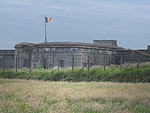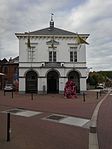Duvel Moortgat Brewery
AC with 0 elementsBreweries of FlandersCompanies based in Antwerp ProvincePuurs-Sint-AmandsVague or ambiguous time from April 2017

Duvel Moortgat Brewery (Brouwerij Duvel Moortgat) is a Flemish family-controlled brewery founded in 1871 in the Antwerp Province (Belgium). Its strong golden pale ale, Duvel, is exported to more than forty countries. Duvel is Brabantian, Ghent and Antwerp dialect for devil, the standard Dutch word being duivel [ˈdœy̯vəl]. Other popular beers include Maredsous and Vedett.
Excerpt from the Wikipedia article Duvel Moortgat Brewery (License: CC BY-SA 3.0, Authors, Images).Duvel Moortgat Brewery
Pastoor Somerslaan,
Geographical coordinates (GPS) Address Nearby Places Show on map
Geographical coordinates (GPS)
| Latitude | Longitude |
|---|---|
| N 51.041996 ° | E 4.32871 ° |
Address
Moortgat Brouwerij
Pastoor Somerslaan
2870
Antwerp, Belgium
Open on Google Maps










